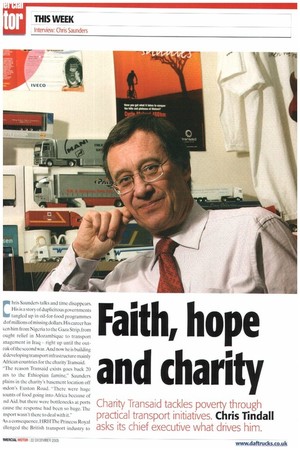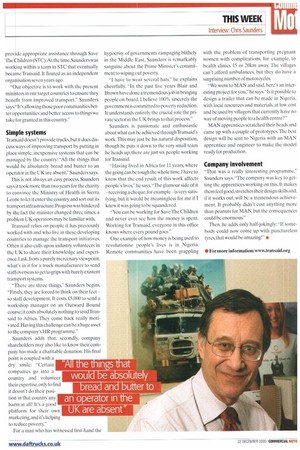Faith, hope and charity
Page 22

Page 23

If you've noticed an error in this article please click here to report it so we can fix it.
Charity Transaid tackles poverty through practical transport initiatives. Chris Tindall asks its chief executive what drives him.
Chris Saunders talks and time disappears. His is a story of duplicitous governments tangled up in oil-for-food programmes d of millions of missing dollars. His career has ken him from Nigeria to the Gaza Strip, from ought relief in Mozambique to transport magement in Iraq — right up until the outeak of the second war. And now he is building d developing transport infrastructure mainly African countries for the charityTransaid. The reason Transaid exists goes back 20 ars to the Ethiopian famine," Saunders plains in the charity's basement location off Indon's Euston Road. "There were huge iounts of food going into Africa because of .nd Aid, but there were bottlenecks at ports cause the response had been so huge. The nsport wasn't there to deal with it."
As a consequence. HRH The Princess Royal 111enged the British transport industry to provide appropriate assistance through Save The Children (STC).At the time, Saunders was working within a team in STC that eventually became Transaid. It floated as an independent organisation seven years ago.
-Our objective is to work with the present ministers in our target countries to ensure they benefit from improved transport," Saunders says."It's allowing those poor communities better opportunities and better access to things we take for granted in this country."
Simple systems
Transaid doesn't provide trucks, but it does discuss ways of improving transport by putting in place simple, inexpensive systems that can he managed by the country: "All the things that would be absolutely bread and butter to an operator in the UK are absent," Saunders says.
This is not always an easy process. Saunders says it took more than two years for the charity to convince the Ministry of Health in Sierra Leone to let it enter the country and sort out its transport infrastructure. Progress was hindered by the fact the minister changed three times, a problem UK operators may be familiar with.
Transaid relies on people it has previously worked with and who live in these developing countries to manage the transport initiatives. Often it also calls upon industry volunteers in the UK to share their knowledge and experience. I ask, from a purely mercenary viewpoint, what's in it for a truck manufacturer to send staff overseas to get to grips with barely existent transport systems.
"There are three things," Saunders begins. "Firstly, they are forced to think on their feet so staff development. It costs £5,0()0 to send a workshop manager on an Outward Bound course; it costs absolutely nothing to send Transaid to Africa. They come back really motivated. Having this challenge can be a huge asset to the company's HR programme."
Saunders adds that, secondly, company shareholders may also like to know their company has made a charitable donation. His final point is coupled with a dry smile: -Certain companies go into a country and volunteer their experti se. only to find it doesn't do their position in that country any harm at all! It's a good platform for their own m arketing, and it's helping to reduce poverty For a man who has witnessed first-hand the UK are assent hypocrisy of governments rampaging blithely in the Middle East, Saunders is remarkably sanguine about the Prime Minister's commitment to wiping out poverty have to wear several hats," he explains cheerfully. "In the past five years Blair and Brown have done a trernendousjob in bringing people on board. I believe 100% sincerely the government is committed to poverty reduction. It understands entirely the crucial role the private sector in the UK brings to that process."
Saunders is passionate and enthusiastic about what can be achieved through Transaid's work. This may just be his natural disposition, though he puts it down to the very small team he heads up; there are just six people working for Transaid.
"Having lived in Africa for 11 years, where the going can be tough the whole time,I have to know that the end result of this work affects people's lives," he says. "The glamour side of it receiving a cheque, for example is very satisfying, but it would be meaningless for me if I knew it was going to be squandered.
"You can be working for Save The Children and never ever see how the money is spent. Working for Transaid, everyone in this office knows where every pound goes."
One example of how money is being used to revolutionise people's lives is in Nigeria. Remote communities have been grappling with the problem of transporting pregnant women with complications, for example, to health clinics 15 or 20km away. The villages can't afford ambulances, but they do have a surprising number of motorcycles.
"We went to MAN and said, here's an interesting project for you," he says." Is it possible to design a trailer that can be made in Nigeria. with local resources and materials, at low cost and be used by villagers that currently have no way of moving people to a health centre?"
MAN apprentices scratched their heads and came up with a couple of prototypes. The best design will be sent to Nigeria with an MAN apprentice and engineer to make the model ready for production.
Company involvement
"That was a really interesting programme," Saunders says. "The company was key to getting the apprentices working on this. It makes them feel good,stretches their design skills and. if it works out, will be a tremendous achievement. It probably didn't cost anything more than peanuts for MAN, but the consequences could he enormous."
Then, he adds, only half-jokingly: "If somebody could now come up with punctureless tyres, that would be amazingr •




























































































































































































